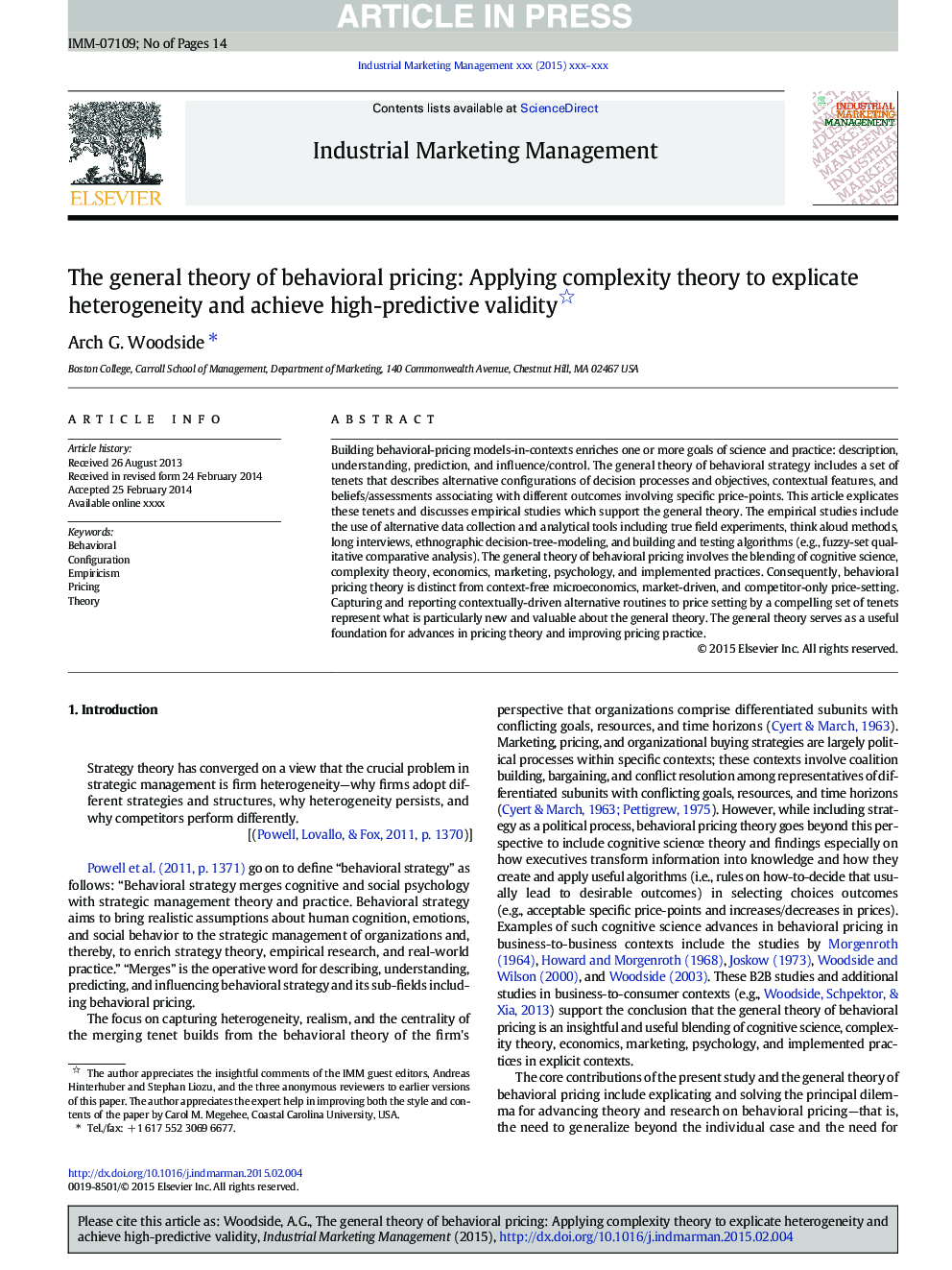| کد مقاله | کد نشریه | سال انتشار | مقاله انگلیسی | نسخه تمام متن |
|---|---|---|---|---|
| 7432801 | 1483455 | 2015 | 14 صفحه PDF | دانلود رایگان |
عنوان انگلیسی مقاله ISI
The general theory of behavioral pricing: Applying complexity theory to explicate heterogeneity and achieve high-predictive validity
ترجمه فارسی عنوان
نظریه کلی قیمت گذاری رفتاری: اعمال نظریه پیچیدگی به بیان ناهمگونی و دستیابی به اعتبار پیش بینی کننده بالا
دانلود مقاله + سفارش ترجمه
دانلود مقاله ISI انگلیسی
رایگان برای ایرانیان
کلمات کلیدی
رفتاری پیکربندی، تجربی قیمت گذاری، تئوری،
ترجمه چکیده
مدل سازی الگوهای رفتاری-قیمت گذاری در یک محدوده یک یا چند اهداف علم و عمل را غنی می کند: توصیف، درک، پیش بینی، و نفوذ / کنترل. تئوری کلی استراتژی رفتاری شامل مجموعه ای از اصول است که توصیف پیکربندی های جایگزین فرایندهای تصمیم گیری و اهداف، ویژگی های متنی و باورها / ارزیابی ها با نتایج مختلفی که شامل نقاط خاص قیمت می شوند، توصیف می شود. این مقاله این اصول را بیان می کند و مطالعات تجربی را که از نظریه عمومی حمایت می کنند، مورد بحث قرار می دهد. مطالعات تجربی شامل استفاده از داده های جمع آوری داده های جایگزین و ابزارهای تحلیلی از جمله آزمایش های حقیقی، روش های افکار مثبت، مصاحبه طولانی، مدل سازی تصمیمی در قوم نگاری و الگوریتم های ساخت و آزمایش (از جمله تجزیه و تحلیل مقایسه ای کیفی فازی) است. نظریه کلی قیمت گذاری رفتاری شامل ترکیب علم شناختی، نظریه پیچیدگی، اقتصاد، بازاریابی، روانشناسی و شیوه های اجرا شده است. در نتیجه، نظریه قیمتگذاری رفتاری متمایز از اقتصاددانان کوچک اقتصادی است، مبتنی بر بازار، و تنها قیمت رقابتی. ضبط و گزارش روشهای متناوب مبتنی بر محتوا به تنظیم قیمت توسط یک مجموعه قانع کننده، نشان دهنده چیزی است که به ویژه در مورد نظریه عمومی جدید و ارزشمند است. نظریه عمومی به عنوان پایه ای مفید برای پیشرفت در نظریه قیمت گذاری و بهبود عمل قیمت گذاری عمل می کند.
موضوعات مرتبط
علوم انسانی و اجتماعی
مدیریت، کسب و کار و حسابداری
بازاریابی و مدیریت بازار
چکیده انگلیسی
Building behavioral-pricing models-in-contexts enriches one or more goals of science and practice: description, understanding, prediction, and influence/control. The general theory of behavioral strategy includes a set of tenets that describes alternative configurations of decision processes and objectives, contextual features, and beliefs/assessments associating with different outcomes involving specific price-points. This article explicates these tenets and discusses empirical studies which support the general theory. The empirical studies include the use of alternative data collection and analytical tools including true field experiments, think aloud methods, long interviews, ethnographic decision-tree-modeling, and building and testing algorithms (e.g., fuzzy-set qualitative comparative analysis). The general theory of behavioral pricing involves the blending of cognitive science, complexity theory, economics, marketing, psychology, and implemented practices. Consequently, behavioral pricing theory is distinct from context-free microeconomics, market-driven, and competitor-only price-setting. Capturing and reporting contextually-driven alternative routines to price setting by a compelling set of tenets represent what is particularly new and valuable about the general theory. The general theory serves as a useful foundation for advances in pricing theory and improving pricing practice.
ناشر
Database: Elsevier - ScienceDirect (ساینس دایرکت)
Journal: Industrial Marketing Management - Volume 47, May 2015, Pages 39-52
Journal: Industrial Marketing Management - Volume 47, May 2015, Pages 39-52
نویسندگان
Arch G. Woodside,
